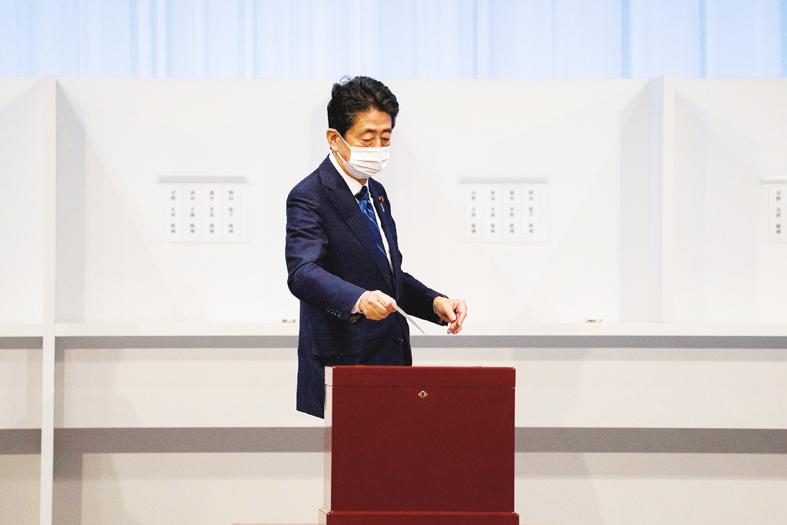China has reacted angrily to a call by former Japanese prime minister Shinzo Abe for Tokyo to consider hosting US nuclear weapons in the wake of Russia’s invasion of Ukraine and rising concern over Chinese aggression toward Taiwan.
Abe, who presided over record defense budgets before resigning in 2020, said Japan should cast off taboos surrounding its possession of nuclear weapons following the outbreak of war in Europe.
“In NATO, Germany, Belgium, the Netherlands and Italy take part in nuclear sharing, hosting American nuclear weapons,” Abe said in a TV interview, Nikkei Asia reported. “We need to understand how security is maintained around the world and not consider it taboo to have an open discussion. We should firmly consider various options when we talk about how we can protect Japan and the lives of its people in this reality.”

Photo: Reuters
Japan, the only nation to have been attacked with nuclear weapons, in Hiroshima and Nagasaki, is part of the US nuclear umbrella, but has for decades adhered to three non-nuclear principles — that it will not produce or possess nuclear weapons or allow them on its territory.
Japanese Prime Minister Fumio Kishida quickly rejected Abe’s call for a debate on the nuclear-sharing option.
“It is unacceptable given our country’s stance of maintaining the three non-nuclear principles,” Kishida, who represents a constituency in Hiroshima, told lawmakers this week.
“Japanese politicians have frequently spread fallacies related to Taiwan and even blatantly made false remarks that violate the nation’s three non-nuclear principles,” Chinese Ministry of Foreign Affairs spokesman Wang Wenbin (汪文斌) told reporters in Beijing.
“We strongly ask Japan to deeply reflect on its history,” Wang said, adding that Tokyo should “be cautious in words and deeds on the Taiwan issue to stop provoking trouble.”
Abe, a conservative whose lifelong political ambition is to revise Japan’s “pacifist” constitution, said any conflict involving China and Taiwan would also constitute an emergency for Japan.
He called on the US to end its “ambiguity” on the defense of Taiwan, noting that it is just 110km from Yonaguni, Japan’s westernmost inhabited island.
“The US takes a strategy of ambiguity, meaning it may or may not intervene militarily if Taiwan is attacked,” Abe said. “By showing it may intervene, it keeps China in check, but by leaving open the possibility that it may not intervene, it makes sure that the Taiwanese forces for independence do not get out of control.”
Abe, leader of the biggest faction in Kishida’s ruling Liberal Democratic Party, has made several hawkish interventions on security policy that enjoy support inside the party, but could provoke a backlash among voters nervous about Japan’s potential involvement in regional conflicts.
China’s state-run Global Times accused Abe of attempting to “unlock” Japanese militarism.
“It is not only ironic, but also a huge real risk, that a group of people in the only country in the world that was bombed by atomic bombs would call for an invitation to the culprit to deploy nuclear weapons in their own territory,” it said in an editorial.

RESPONSE: The transit sends a message that China’s alignment with other countries would not deter the West from defending freedom of navigation, an academic said Canadian frigate the Ville de Quebec and Australian guided-missile destroyer the Brisbane transited the Taiwan Strait yesterday morning, the first time the two nations have conducted a joint freedom of navigation operation. The Canadian and Australian militaries did not immediately respond to requests for comment. The Ministry of National Defense declined to confirm the passage, saying only that Taiwan’s armed forces had deployed surveillance and reconnaissance assets, along with warships and combat aircraft, to safeguard security across the Strait. The two vessels were observed transiting northward along the eastern side of the Taiwan Strait’s median line, with Japan being their most likely destination,

GLOBAL ISSUE: If China annexes Taiwan, ‘it will not stop its expansion there, as it only becomes stronger and has more force to expand further,’ the president said China’s military and diplomatic expansion is not a sole issue for Taiwan, but one that risks world peace, President William Lai (賴清德) said yesterday, adding that Taiwan would stand with the alliance of democratic countries to preserve peace through deterrence. Lai made the remark in an exclusive interview with the Chinese-language Liberty Times (sister paper of the Taipei Times). “China is strategically pushing forward to change the international order,” Lai said, adding that China established the Asia Infrastructure Investment Bank, launched the Belt and Road Initiative, and pushed for yuan internationalization, because it wants to replace the democratic rules-based international

RELEASED: Ko emerged from a courthouse before about 700 supporters, describing his year in custody as a period of ‘suffering’ and vowed to ‘not surrender’ Former Taiwan People’s Party (TPP) chairman Ko Wen-je (柯文哲) was released on NT$70 million (US$2.29 million) bail yesterday, bringing an end to his year-long incommunicado detention as he awaits trial on corruption charges. Under the conditions set by the Taipei District Court on Friday, Ko must remain at a registered address, wear a GPS-enabled ankle monitor and is prohibited from leaving the country. He is also barred from contacting codefendants or witnesses. After Ko’s wife, Peggy Chen (陳佩琪), posted bail, Ko was transported from the Taipei Detention Center to the Taipei District Court at 12:20pm, where he was fitted with the tracking

The National Development Council (NDC) yesterday unveiled details of new regulations that ease restrictions on foreigners working or living in Taiwan, as part of a bid to attract skilled workers from abroad. The regulations, which could go into effect in the first quarter of next year, stem from amendments to the Act for the Recruitment and Employment of Foreign Professionals (外國專業人才延攬及僱用法) passed by lawmakers on Aug. 29. Students categorized as “overseas compatriots” would be allowed to stay and work in Taiwan in the two years after their graduation without obtaining additional permits, doing away with the evaluation process that is currently required,